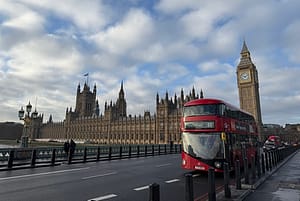The capital must reinvent itself in order to emerge stronger following the COVID-19 pandemic and maintain its position as a world-leading business hub, according to a new report published today by the City of London Corporation.
London Recharged: Our vision for London in 2025, produced in partnership with Oliver Wyman and Arup, sets out detailed recommendations to aid the capital’s recovery and enhance its long-term competitiveness by focusing on innovation, collaboration, inclusivity and sustainability.
The report finds that business remains committed to central London and recognises the value of working alongside customers, clients and competitors. Nonetheless, investment in skills, digital infrastructure and built environment will be needed to ensure London remains the global centre of choice.
It also explores how London’s office stock and built environment can be transformed in response to trends such as increased remote and flexible working.
The report’s recommendations include:
- Create spaces to innovate, akin to start-up incubators focused on a specific theme (e.g. Station F in France and Level 39 in London). The incubators should provide work spaces with experts from government, academia and business to coalesce and innovate on specific priority themes.
- Pilot transformation of London’s office stock to support new uses, including the development of ‘hyper flexible spaces’. Motivate SMEs and artists to re-enter the city centre by providing ‘hives’ of affordable work space and access to basic infrastructure.
- Explore ways to innovate London’s transport network considering new consumer/ commuter behaviours and the network’s financial difficulties. Options could include the creation of ‘flexible working’ season tickets.
- Conduct a regulatory review of listing structures to ensure the UK’s competitiveness relative to other listing locations.
- Make the case for visa structures and immigration procedures that can make it simpler for skilled workers to come to the country.
- Equip businesses to benefit from digital transformation by establishing a digital adoption fund and make it easier to access growth finance for business.
- In partnership with leading diversity organisations, endorse a suite of diversity targets for financial services, professional services and tech organisations to adopt and use as a roadmap. Provide dedicated access to funding for specific underrepresented groups (e.g. female, black or minority ethnic founders).
The report also calls for London representatives to work more closely with leaders of other UK cities to support the Government’s levelling-up agenda. This would help to promote the capital as a global gateway for trade and investment into firms based in other parts of the UK.
William Russell, the 692nd Lord Mayor of the City of London said, “The capital’s success throughout history has been a story of constant reinvention.
“It is more important than ever that London adapts quickly to today’s challenges so that it remains a place where people want to work, live and visit tomorrow.
“This report sets out detailed measures that can help the capital thrive and evolve as we get through the current pandemic. A vibrant London will help to drive our recovery forwards as we work with the rest of the UK.”
Catherine McGuinness, Policy Chair at the City of London Corporation said, “London is today facing major challenges. Coronavirus, the UK’s exit from the European Union and increasing protectionism across the globe are all threats to the capital’s role as an international business hub.
“Some trends have been accelerated by the pandemic, while others appear to have been reversed. We must reimagine London in order to seize the moment and ensure it evolves in response to this new paradigm.
“Just as London enters tighter restrictions might seem an odd time to talk about the future – but it’s more important than ever that we use this time to prepare, and ensure that London is in the best possible shape when the recovery restarts.
“Implementing these recommendations will underpin the capital’s competitiveness by supporting innovation, improving sustainability and offering greater opportunities to our diverse population. Business, government, regulators and academics all have a role to play. London must build back better in order to remain fit for the future.”
The report also examines the future of legal services in a detailed case study. Sector-specific recommendations include:
- Prioritise investment and rollout of technology-enabled court processes that enhance the rule of law and ensure delivery of justice in an accessible, efficient, and timely manner.
- Emphasize the importance of innovation in legal services delivery to include agile and flexible ways of working; remote access of services; and the adoption of lawtech to better serve clients domestically and abroad.
- Upskill legal practitioners to embrace digitised legal services as the status quo
- Finance the development of platforms for alternative dispute resolution that are reliable, secure, and interoperable and improve the sustainability of legal services.
John Romeo, Managing Partner, Oliver Wyman said, “Though the negative impact of COVID-19 is undeniable, we believe that it presents an opportunity for London and the rest of the UK to proactively shape their futures. Both public and private sectors are reflecting on how to respond to a shared challenge and ensure we emerge stronger. London must lean into the global trends shaping the city and embrace the momentum for change that the pandemic has created.
“Critically, this reports sets our recommendations for all of London and the UK, not just the City. They are dependent on the talent and wealth of expertise of leaders in business, government and academia across the country.
“We are committed to helping foster the partnerships, investment, and conditions for success that will ensure London’s future as the international platform for innovation and collaboration.”






Leave a Comment